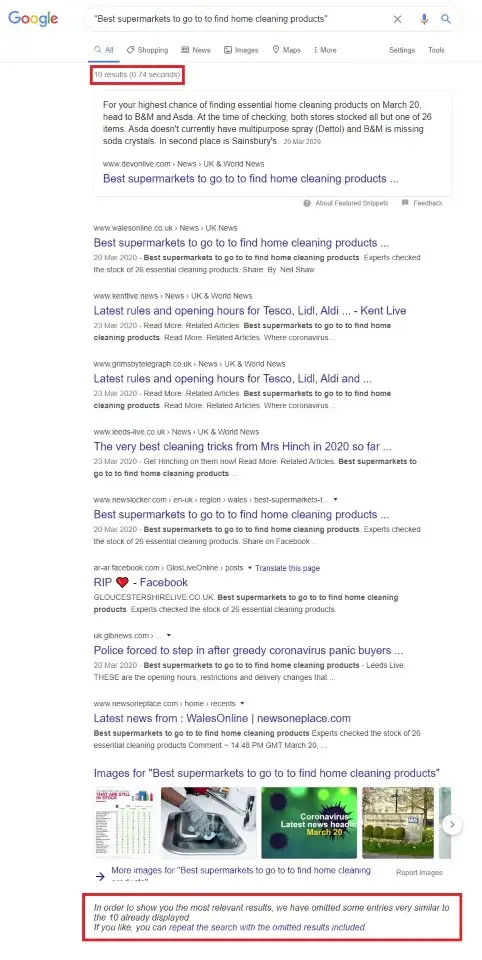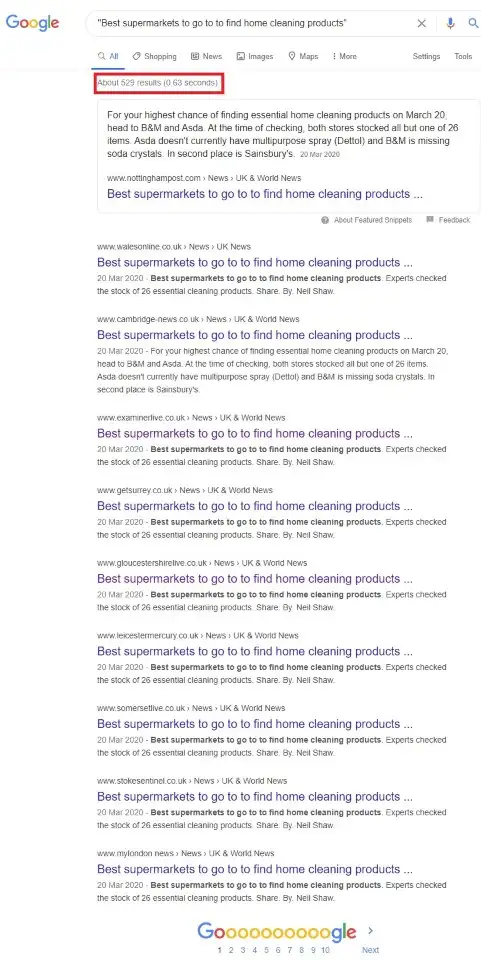
Digital PR: How Effective are Syndicated Links?
Syndicated Placements – Are they a complete waste of time?
I have seen this exact question raised a few times over the last few weeks. The short answer is this: It depends what your goals are.
If your goals are coverage and PR then no, it is not a waste of time. In fact, in most cases, if the individual syndicated piece is on a busy publication with good readership and authority, then it's perfect.
But, if your goals are ranking increases through link acquisition then yes, it’s a complete waste of time even if the links are followed.
So why do we say this? Well, there are logical arguments to this, but also data to back it up (this great BuzzSumo study being just one example!).
Let’s take the following example and search for some coverage we recently gained for our client which was syndicated.
Go to Google and search for “Best supermarkets to go to to find home cleaning products“
Make sure you keep the quotation marks in place.
You should see similar results to this:

Now, there are two interesting things about that page to note. The first is that Google is only displaying 10 results, and the second is the notice at the bottom that says:
“In order to show you the most relevant results, we have omitted some entries very similar to the 10 already displayed.
If you like, you can repeat the search with the omitted results included.”
Clicking on that link brings up the following:

Note that the number of results has now gone up to 529 from 10!
That means that Google has discovered hundreds more pages that contain the exact same, or very near to, content as the first 10 results they originally displayed, but decided to hide it as it’s aware that it’s not adding any value to the searcher.
In this case, most of the pages are from the same group of papers called ReachPLC, an umbrella group owning over 100 titles across the UK. Although recently placed behind Cloudflare, they do in fact all reside on the same IP address and contain some articles that are syndicated across the whole range of titles.
In this case, they are also canonicalised to the originating title. But even in cases where this is not true, Google would still recognise them as syndicated.
So, the question is: If Google is omitting the vast majority of the syndicated pages from searcher results as it sees no added value, why would it allow any Page Rank to pass through links even if the links do happen to be followed links?
The Data
And the data backed argument? Well, in 2014 Reboot was the owner of one of the largest privately owned and kept PBN network. Over 2000 sites.
We used it for assisting with rankings for smaller clients that could not afford to pay for fully fledged Digital PR agency. We were always upfront about it and have made the clients aware of the risks involved. But, later that year with Penguin 3.0, and then in 2016 4.0, the risks have become far too much for a reputable agency to carry. So, even though none were ever de-indexed or penalised, we completely halted the use of our PBN. So, we were left with over 2000 sites and were not sure what to do with them all. So, we decided to do with them what we do best: Run experiments.
Well, one of those experiments was to look at links from sites from the same C-class IP addresses. At the time it was quite a rampant opinion that those links do not have the same power as unique IP links. We were not convinced. And like we did with the outdated view that outgoing links were bad for your site retention of Page Rank (proved that opinion wrong in 2016), we set out to prove that links from same IP address would not act any differently than ones from unique IP addresses.
We set up an experiment which had 10 links from sites on the same IP, while the other site had 10 individual links – each with similar DA metrics. To our surprise, the site with 10 individual links shot up in the rankings, while the one with links from 10 duplicate IP sites actually fell in the rankings slightly. We also observed at the time how Google also had the same omitted results effect for a string search, which was noted on the experiment log.
So, although we did not set out to look at syndicated content, it seems that even having links from the same IP was enough. As a result, I think it’s quite safe to assume that if it’s the same IP AND the same content AND Google omits the results, the PR links would be nullified.
In short, it does seem that syndicated digital PR links are great for PR, but not so great for SEO.
Do we report such links to clients? Yes. But only to clients that are using our services for digital PR. Those clients that are more concerned with rankings only, we avoid reporting on syndicated links.
